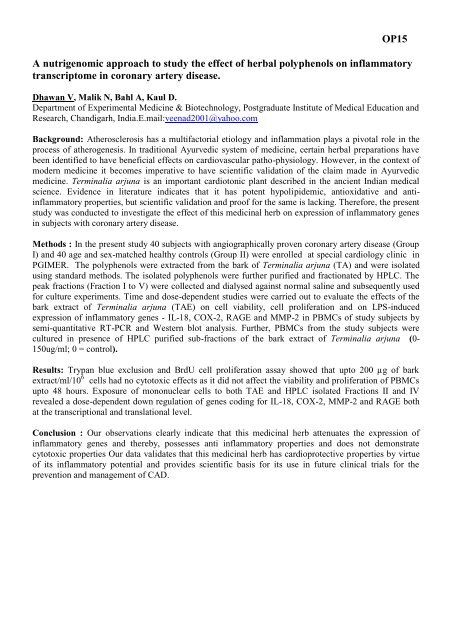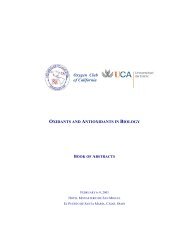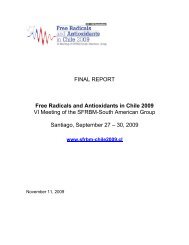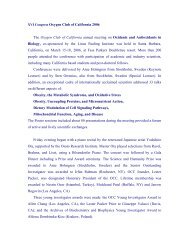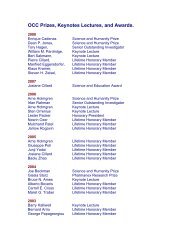PROGRAMME SCIENTIFIQUE - Oxygen Club of California
PROGRAMME SCIENTIFIQUE - Oxygen Club of California
PROGRAMME SCIENTIFIQUE - Oxygen Club of California
Create successful ePaper yourself
Turn your PDF publications into a flip-book with our unique Google optimized e-Paper software.
OP15<br />
A nutrigenomic approach to study the effect <strong>of</strong> herbal polyphenols on inflammatory<br />
transcriptome in coronary artery disease.<br />
Dhawan V, Malik N, Bahl A, Kaul D.<br />
Department <strong>of</strong> Experimental Medicine & Biotechnology, Postgraduate Institute <strong>of</strong> Medical Education and<br />
Research, Chandigarh, India.E.mail:veenad2001@yahoo.com<br />
Background: Atherosclerosis has a multifactorial etiology and inflammation plays a pivotal role in the<br />
process <strong>of</strong> atherogenesis. In traditional Ayurvedic system <strong>of</strong> medicine, certain herbal preparations have<br />
been identified to have beneficial effects on cardiovascular patho-physiology. However, in the context <strong>of</strong><br />
modern medicine it becomes imperative to have scientific validation <strong>of</strong> the claim made in Ayurvedic<br />
medicine. Terminalia arjuna is an important cardiotonic plant described in the ancient Indian medical<br />
science. Evidence in literature indicates that it has potent hypolipidemic, antioxidative and antiinflammatory<br />
properties, but scientific validation and pro<strong>of</strong> for the same is lacking. Therefore, the present<br />
study was conducted to investigate the effect <strong>of</strong> this medicinal herb on expression <strong>of</strong> inflammatory genes<br />
in subjects with coronary artery disease.<br />
Methods : In the present study 40 subjects with angiographically proven coronary artery disease (Group<br />
I) and 40 age and sex-matched healthy controls (Group II) were enrolled at special cardiology clinic in<br />
PGIMER. The polyphenols were extracted from the bark <strong>of</strong> Terminalia arjuna (TA) and were isolated<br />
using standard methods. The isolated polyphenols were further purified and fractionated by HPLC. The<br />
peak fractions (Fraction I to V) were collected and dialysed against normal saline and subsequently used<br />
for culture experiments. Time and dose-dependent studies were carried out to evaluate the effects <strong>of</strong> the<br />
bark extract <strong>of</strong> Terminalia arjuna (TAE) on cell viability, cell proliferation and on LPS-induced<br />
expression <strong>of</strong> inflammatory genes - IL-18, COX-2, RAGE and MMP-2 in PBMCs <strong>of</strong> study subjects by<br />
semi-quantitative RT-PCR and Western blot analysis. Further, PBMCs from the study subjects were<br />
cultured in presence <strong>of</strong> HPLC purified sub-fractions <strong>of</strong> the bark extract <strong>of</strong> Terminalia arjuna (0-<br />
150ug/ml; 0 = control).<br />
Results: Trypan blue exclusion and BrdU cell proliferation assay showed that upto 200 µg <strong>of</strong> bark<br />
extract/ml/10 6 cells had no cytotoxic effects as it did not affect the viability and proliferation <strong>of</strong> PBMCs<br />
upto 48 hours. Exposure <strong>of</strong> mononuclear cells to both TAE and HPLC isolated Fractions II and IV<br />
revealed a dose-dependent down regulation <strong>of</strong> genes coding for IL-18, COX-2, MMP-2 and RAGE both<br />
at the transcriptional and translational level.<br />
Conclusion : Our observations clearly indicate that this medicinal herb attenuates the expression <strong>of</strong><br />
inflammatory genes and thereby, possesses anti inflammatory properties and does not demonstrate<br />
cytotoxic properties Our data validates that this medicinal herb has cardioprotective properties by virtue<br />
<strong>of</strong> its inflammatory potential and provides scientific basis for its use in future clinical trials for the<br />
prevention and management <strong>of</strong> CAD.


